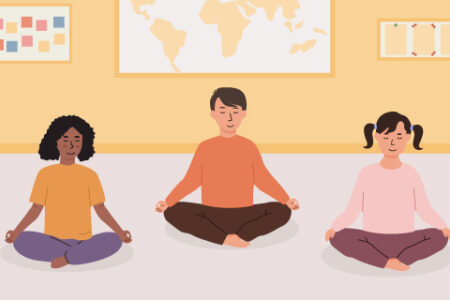Who cares for the carers? Stress reduction in healthcare workers using MBSR
40% of nurses quit working in healthcare within 2 years of graduation. But with life expectancy on the rise, demand for specialised healthcare professionals will rise. How can we improve nurses’ work environment and keep them in the profession?
In 2022, Conny Helder, Minister of Long-Term Care, addressed the Dutch parliament in a letter expressing her concerns about the increasing scarcity of healthcare professionals. By 2031, there is expected to be a deficit of 135,000 healthcare-workers. In 2020, one in seven people were employed in the healthcare sector, but by 2040, this ratio should ideally be one in four employees to maintain acceptable quality standards. To attract employees, it is crucial to remember that our nurses deserve a work environment that is both stable and intellectually stimulating.
Unfortunately, at present, the work environment is far from ideal, and the workload is excessive. At this point, nearly 50% of employees experience their workload as way too high. Contributing factors include administrative tasks, challenging patient interactions, and staff shortages. The time spent on those administrative tasks, for instance, reduces the time available for caring for patients. Another contributory factor is lack of proper support, especially for junior nurses. Regrettably, many undergraduate nurses already grapple with burnout due to low feelings of self-efficacy and inadequate support. If we aspire to a future with competent healthcare professionals who can wholeheartedly dedicate themselves to their work, mentorship by experienced nurses is imperative.
To retain healthcare professionals, it is important to address work environment issues and increase well-being. The Job Demands-Resources Theory (JD-RT) is used to evaluate employees’ well-being through two key components: job demands and job resources. If there is an imbalance between these two components, particularly if demands are high and resources scare, the risk of experiencing stress and subsequently developing burnout increases. This phenomenon was observed in a study utilizing the JD-RT to investigate the predictors of burnout in recently graduated nurses. The findings revealed that high workload and workplace bullying were predictive of burnout, while job resources such as a supportive work environment and a sense of control were associated with increased work engagement and decreased intentions to leave the job.
Improving the nursing work environment is important not only for nurses themselves: indirectly it also has a positive impact on patient safety. The entire burden of the scarcity of resources should not fall on the shoulders of healthcare professionals. We should be conscious of the responsibilities they take on, especially considering the numerous external factors they must navigate while continuing to provide compassionate care for individuals. One moment they’re being insulted for hours, the next they’re assisting someone in the final hours of life. These professionals deserve better, especially in light of their unwavering commitment during challenging times, such as the COVID-19 pandemic.
In my view, healthcare work is only sustainable if it is driven by genuine passion, combined with employee autonomy where possible. Therefore, solutions should prioritize the fundamental well-being of healthcare workers.
Mindfulness-Based Stress Reduction
Mindfulness-Based Stress Reduction (MBSR) explores an individual’s present experience in relation to current thoughts and physical and emotional sensations including meditation, yoga, body awareness, and emotional awareness. It promotes understanding, acceptance, and reduction of suffering. Considering the aforementioned stresses and challenges faced by healthcare workers, this might be a way to help them change their way of coping during their life and job. An integrative review of studies on MBSR for registered nurses revealed that 60% of the studies found a significant effect of MBSR on stress. Mindfulness was increased, and burnout was decreased. Another study found an effect of MBSR on the academic and clinical success of undergraduate nurses: there was an improvement in their levels of stress and anxiety. Furthermore, MSBR also had an influence on the nurses’ experience of self-efficacy and self-awareness. Undergraduate nurses were able to acknowledge their limitations, with an increase of academic focus and capacity for empathic, patient-centered care.
(How) can we make this work?
Given such convincing results with big effects on several aspects of healthcare professionals’ well-being, why hasn’t MBSR already been introduced in hospitals and other healthcare departments? Probably because not everyone in healthcare believes MBSR could be an intervention for patients, let alone for healthcare professionals. When in 2018 criticism arose regarding a course concerning complementary healthcare, mindfulness was mentioned in the same breath as quackery. In addition, mindfulness is an instrument to teach another way of coping in different situations and is not learned in a day. Time investment and a patient work environment are needed to experience the positive effects of MBSR, and time and patience can sometimes be in short supply in healthcare work environments.
Small steps to success
In 2021, I was among the 40% of recent nursing graduates to leave the profession: I decided to study psychology instead. But now I’ve made the decision to give my nursing career another chance. Just a few days ago, as I was writing this, I took on a new role as a supervisor for undergraduate nurses in a nursing home. This blog will not ensure that the shortages are resolved, or that the outflow of nurses is reduced in a matter of years. That would be way too idealistic. However, at the very least, I can take on the responsibility of providing undergraduate students with a supportive learning environment that includes mindfulness. And that's precisely what I intend to do.





